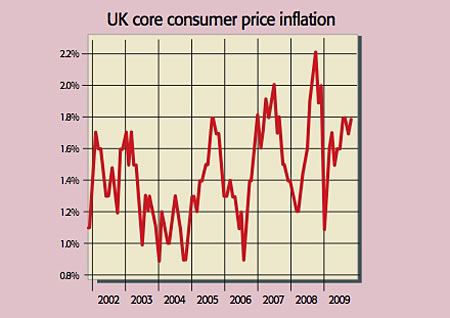
So much for deflation fears. UK consumer price inflation showed a ‘surprise’ rise to 1.5% in October, as the price of second-hand cars – whose supply has been cut by the UK government’s ‘cash for bangers’ scheme – soared by 13.2% year-on-year.
The weak pound also drove up the cost of imports such as food and DVDs, while petrol prices were another key reason behind the rise. Meanwhile, core inflation, which excludes food and energy and is supposed to be a better measure of underlying inflation pressures in the economy, hit 1.8%, not far below the Bank of England’s 2% target.
What the commentators said
“October’s inflation spike-up looks like the start of a relatively short, sharp rising trend”, said Global Insight’s Howard Archer. “While CPI’s likely to reach 2.5% and could well go higher still in early 2010, this should prove temporary. Inflation is likely to moderate thereafter.”
But others are less sanguine. “It would be foolhardy to dismiss this recent pick-up in prices as a mere blip,” said Edmund Conway in The Daily Telegraph. “The fall in the pound is making life more expensive for Britons, who are already struggling with falling wage inflation.”
And there could be worse to come, said Alan Clarke of BNP Paribas. “It’s up, up and away… we’ll get to 3% or above by January. Everyone knows this is coming, the Bank of England included.”
However, the biggest risk may not be higher consumer prices, noted Investec’s Philip Shaw. The minutes of the Bank’s monetary policy committe meeting showed a three-way split on whether we should add more money to the system via quantiative easing (the final decision was to add another £25bn). This hesitation was significant and warranted, said Shaw, given the possible side effects. We need to be “very mindful of… the risk of the build-up of another asset price bubble”.